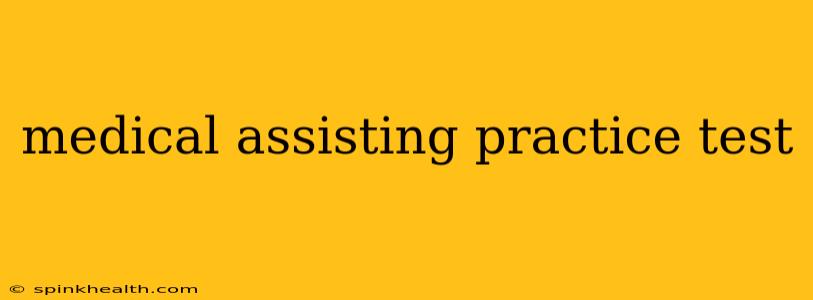Ace Your Medical Assisting Practice Test: A Journey Through Key Concepts
So, you're gearing up for your medical assisting practice test? The butterflies are fluttering, the textbooks are open, and the pressure is on. Don't worry, you're not alone! Many aspiring medical assistants feel the same way. This isn't just another test; it's a stepping stone towards a rewarding career dedicated to patient care and medical support. Let's transform that nervous energy into focused preparation. Think of this guide as your trusted companion, taking you through key areas and answering common questions along the way.
This isn't just a collection of questions and answers; it's a narrative journey designed to help you understand the concepts behind the questions, thereby boosting your comprehension and confidence.
What are the key areas covered in a medical assisting practice test?
A typical medical assisting practice test covers a broad range of subjects, reflecting the multifaceted nature of the role. Expect questions spanning administrative duties, clinical procedures, medical terminology, and patient interaction. Think of it like this: you’re not just learning facts; you’re learning how to navigate a real-world medical setting. The test assesses your readiness to handle the daily challenges and responsibilities of a medical assistant.
What are some common administrative tasks a medical assistant performs?
Imagine the bustling atmosphere of a doctor's office. A medical assistant's administrative role is crucial to keeping everything running smoothly. This includes scheduling appointments, managing patient records (both paper and electronic), handling insurance claims, answering phones, and greeting patients. It also involves processing correspondence, updating patient information, and maintaining the overall organization of the office. The efficiency of your administrative skills directly impacts the patient experience and the overall flow of the clinic. Think of yourself as the conductor of a well-oiled orchestra, ensuring every instrument plays its part.
What are some of the clinical procedures medical assistants might perform?
The clinical side of medical assisting involves direct patient care under the supervision of a physician. This could involve taking vital signs (temperature, pulse, blood pressure, respiration), assisting with examinations, preparing patients for procedures, drawing blood, administering injections (under proper supervision), and collecting specimens for laboratory testing. Sterilization and disinfection techniques are also crucial, ensuring a clean and safe environment for both patients and staff. You’ll be a vital link in ensuring accurate diagnoses and effective treatment plans. Remember, accuracy and attention to detail are paramount in every clinical procedure.
How important is medical terminology in a medical assistant’s role?
Mastering medical terminology is not just about memorizing long words; it's about understanding the language of medicine. Accurate communication is the backbone of effective healthcare. Misunderstanding a term could have serious consequences. A strong grasp of medical terminology allows you to accurately document patient information, understand physician orders, communicate effectively with patients and colleagues, and participate meaningfully in the healthcare team.
What kind of patient interaction skills are tested?
Medical assistants are the frontline representatives of the medical practice. Your interactions with patients significantly impact their experience. Empathy, professionalism, and effective communication are essential. The test may assess your ability to handle different patient personalities, address their concerns, provide clear instructions, and maintain patient confidentiality. Remember, building rapport and fostering trust are vital in providing compassionate patient care.
How can I prepare effectively for my medical assisting practice test?
Preparation is key! Review your course materials thoroughly, focusing on areas where you feel less confident. Practice questions are invaluable – they not only familiarize you with the test format but also highlight areas needing further review. Consider creating flashcards for medical terms and clinical procedures. Study with colleagues or find a study group to discuss challenging concepts and practice explaining procedures to each other. Most importantly, believe in your ability and your preparation. Your hard work will pay off!
Remember, this is not just a test; it’s a testament to your dedication and commitment to a fulfilling career in healthcare. Good luck!

